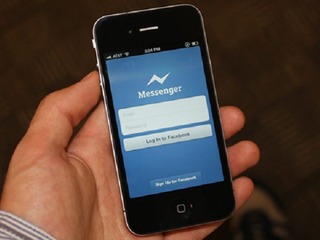DUOS expands AI capabilities to help seniors apply for assistance programs
It will complete and submit forms, and integrate with state benefit systems
Read more...
It's been over a year now since Messenger was officially kicked out of the Facebook app, and asked to prove itself out on its own. The result has been a huge success, with hundreds of millions of users downloading the app, and new features.
Now Messenger is getting the most exciting update yet: it's own personal assistant.
Announcd in a Facebook post from David Marcus, Vice President of Messaging Products at Facebook, on Wednesday, the new service will be called "M," and it will be a direct competitor to Siri and Cortana.
"M is a personal digital assistant inside of Messenger that completes tasks and finds information on your behalf. It's powered by artificial intelligence that's trained and supervised by people," Marcus wrote.
In fact, he says that M will be able to do more than other similar services, being able to "actually complete tasks on your behalf." hat might be making purchases, get gifts delivered, making appointments, as well as booking restaurants and making travel arrangements.
"This is early in the journey to build M into an at-scale service. But it's an exciting step towards enabling people on Messenger to get things done across a variety of things, so they can get more time to focus on what's important in their lives."
Marcus also spoke to Wired about M, revealing more details about how it works, including that it will be available to only a few hundred people in the Bay Area to start, before being rolled out to all users "slowly over time."
For users who do have access to it right now, they will see a small button on the bottom of the app, that will let them send a note to M, in exactly the same way they send messages to other users. It can then ask followup questions in the message thread, and send updates as the task is completed.
Here's the interesting part: there is always going to be a person behind each message, who will be able to help out when the computer has trouble. Therefore, users will never know if they were helped by a compute, or if a person has stepped in to assist.
This is the example that Marcus gave: if someone asks M to plan a birthday dinner for their friend, the computer would book the Uber and the restaurant, but a person might go the extra mile and send over birthday cupcakes from their favorite bakery.
There is one more important thing to point out: despite it being obvious for the past couple of years that Facebook has many plans for all of the data it has collected on people over the years, including a potential search engine, right now M doesn't use any of that data. All it knows about users is based on questions it has been asked. So in the above example, it would only know what bakery to get those cupcakes from based on if that person had asked M about going there, not from liking the page on Facebook.
Of course, it is entirely possible that this could change, but at least for now there is a divide between M and Facebook.
This is just the latest step toward Facebook making Messenger a real competitor in the space.
Since it was decoupled last year, Messenger has racked up a total of 700 million users. Facebook, in the meantime, has given it new features, like peer-to-peer payments, as well as opening up the platform for developers earlier this year.
The platform started with more than 40 new apps, include ESPN, Bitmoji, JibJab, Selfied, The Weather Channel and Tempo.
This is a bold move by Facebook, as it is now going head to head against both Google and Apple. Facebook is a coming in this a little late, but starting out with 700 million users, and counting, will give it a big leg up.
(Image source: facebook.com)
It will complete and submit forms, and integrate with state benefit systems
Read more...The bill would require a report on how these industries use AI to valuate homes and underwrite loans
Read more...The artists wrote an open letter accusing OpenAI of misleading and using them
Read more...


